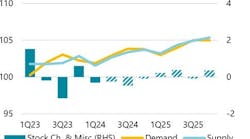The unwritten rule guiding leaders of publicly traded E&P companies is that reserves added must exceed reserves depleted during the fiscal year. Wall Street demands it. The problem is that exploration is risky and therefore unpredictable, so lean years crop up among the good ones.
But since the golden rule must be honored, ways must be found to put the annual reserves balance sheet in the black. This can be done by buying reserves and/or by making upward revisions to reserves booked previously. If there's still a deficit, the only recourse is to go back and tweak the numbers. There's no implication of dishonesty here, for as pointed out (OGJ, June 7, 2004, p. 17) moving hyrdrocarbons up the ladder from one SEC-defined category to another is to some extent a judgment call. There's an overwhelming urge to accommodate Wall Street by "accelerating" reserves during a lean year with the rationalization that overestimates can always be subtracted from next year's bonanza without significantly impairing the bottom line. But lean years sometimes arrive consecutively and corporate memory is short. On the flip side, crafty managers will sometimes "hold back" reserves in a particularly good year as insurance to be booked in the lean; but overall the pressure is upward.
Until CEOs are willing to accept that long term reserves growth is often a process of two steps forward, one step back, consistent with the ups and downs of exploration, we will continue to witness an embarrassing litany of major reserves write-downs, the inevitable consequence of too many year-end adjustments.
James A. Brown
Geologist
Casper, Wyo.

